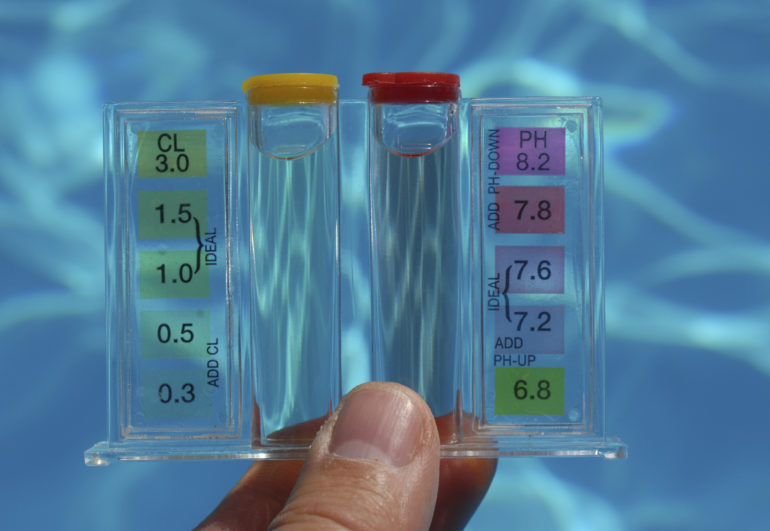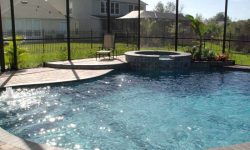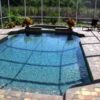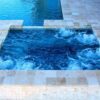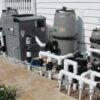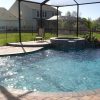To keep your Trinity swimming pool clean and healthy, it's absolutely essential to manage your pool’s chemical levels.
To do this, it's important to test your pool water regularly and make adjustments to maintain the correct balance. Maintaining the correct chemical balance, good filtration and fresh water are essential when it comes to pool operation. To help you understand the proper chemical management, today we have...
4 Tips for Properly Managing the Chemical Balance of a Swimming Pool
1) pH above 7.8 is too high and may cause discoloration and stains to the pool surface. To lower the pH, add muriatic acid as needed. On the other side, a low pH can cause damage the pool equipment, so be careful not to overuse low pH stablizers.
2) Low alkalinity affects the pH of your pool and can damage your water heater and cause discoloration and stains. Add sodium-bicarbonate to raise the alkalinity.
3) Low calcium hardness can damage a pool's surface and strip metals out of valves, heaters and other metallic parts. We recommend using Scale Free from Natural Chemistry once per month to prevent low calcium.
4) Phosphates can end up in your water by tracking lawn fertilizer into the pool. They can go undetected because they require a separate test to detect their presence. Phosphates can be a problem because they react with the chlorine and basically cancel out the chlorine’s effectiveness. Phos Free by Natural Chemistry is the best way to remove phosphates from your pool. You can keep your pool phosphate free by regularly using Phos Free as part of your pool chemical maintenance.
Preventive Measures to Keep Chemicals Stable
Preventing chemical imbalances in your pool starts with consistent swimming pool maintenance and smart practices.
- Maintain a steady water level to avoid diluting or concentrating chemicals, which can disrupt balance.
- Use a pool cover when the pool is not in use to minimize debris and reduce evaporation.
- Encourage swimmers to rinse off sunscreen, oils, and dirt before entering the pool to reduce contaminants.
- Regularly clean the pool, including skimming, vacuuming, and maintaining filters, to keep water clear and reduce the workload on chemicals.
- Consult swimming pool builders in Trinity FL for expert advice and tailored maintenance plans to keep your pool pristine and chemically balanced year-round.
Long-Term Effects of Poor Chemical Maintenance
Neglecting proper chemical maintenance in your pool can lead to serious long-term consequences for both your health and the longevity of your investment. Poor chemical balance may cause algae growth, cloudy water, and unpleasant odors, making your pool less inviting and potentially unsafe for swimming. Over time, corrosive water can damage pool equipment, such as pumps, filters, and heaters, while imbalanced pH levels can erode pool surfaces and cause staining. Additionally, improperly sanitized water poses health risks, such as skin irritation and waterborne illnesses. To avoid these issues, regular care and expert guidance from swimming pool companies in Trinity FL can ensure your pool remains safe, beautiful, and in excellent condition for years to come.
Testing your pool water regularly will help you determine what adjustments need to be made to manage a good chemical balance in your water. This will ensure that your pool will always be healthy and ready for your enjoyment, and it will also save you from costly stains and repairs.
If you are considering a new pool or interested in swimming pool remodeling in Trinity FL, and surrounding areas, Grand Vista Pools is the one to call.

